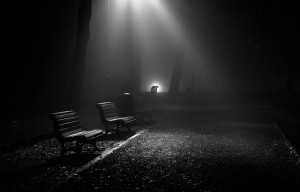 Imagine a story as a living, breathing planet. A lot of people live on it, and each one has his or her own perception of life. Everyone sees everything differently. In theory, every story has just as many perspectives. How do you know which one is important?
Imagine a story as a living, breathing planet. A lot of people live on it, and each one has his or her own perception of life. Everyone sees everything differently. In theory, every story has just as many perspectives. How do you know which one is important?
There are a lot of things to consider, but when writing a first draft considerations are meaningless. Sitting at a keyboard to write a story is a lot like sitting on a bench in Central Park. Lots of people walk by without giving you the slightest bit of attention. Depending on your methodology, you either wait for someone to sit down and start a conversation, or you scream profanities at them like a nut-job. I know people who sit down to write, and if it isn’t coming that day, they get back up and go do laundry. I am on the opposite end of the spectrum. My park scenario is chasing people down, screaming “You can’t get away from me!”
Whoever I manage to tackle becomes my perspective. Like most predators, I tend to pick off the weak. My characters generally have a multitude of issues. They are fragile, emotionally and sometimes physically. I hold them down and make them cry. A lot of times, that means that the point-of-view of my first draft is decided for me. It belongs to whoever wanders too close to my particular park bench.
After the first draft is finished, I have to start worrying about actual technique and theory. My story may or may not be best served by the perspective I have discovered. In “Flute of the Dead,” which will be appearing in Bete Noire Magazine’s anniversary issue this coming Halloween, I follow Len, a tribal musician, in his exodus from his home as he flees cannibalistic invaders. In the original story, Len died about three pages in. The story revolved around his 8 year-old sister. After the first draft, I completed a major reconstruction of the story, which included the deletion of my original protagonist.
There is no loyalty in fiction. Writing is a solitary profession. Editing is a cruel business. You write from your heart, pouring your soul onto paper. You edit with your brain. Every element has to carry its own weight. Those that don’t must be cut, no matter how beautiful or clever they seem.
Things like POV and perspective are tools for the creation of art. It is my duty as a writer to use those tools as efficiently as possible. Sometimes, as with “Flute of the Dead,” that means drastic restructuring of story elements, eliminating characters and scenes, creating new ones in their place, and various other modifications.
The goal is strengthen the story as much as possible. Trial and error will help me to do that. Ultimately, it fortifies both my story and my career. The important thing is to find a voice and hold it down long enough to get the story out, but still be willing to tackle the next guy if need be.
Leave a Reply